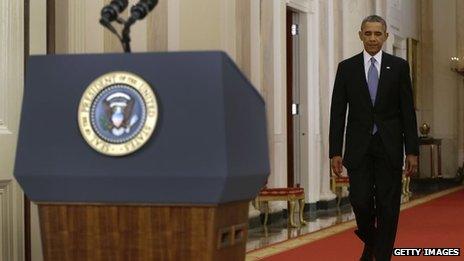Mark Mardell: Obama's Syria speech almost irrelevant
- Published
- comments

By the time Mr Obama reached the podium for his long-awaited speech, events had rendered it largely irrelevent
"The US military does not do pinpricks." That was about the only good line in a speech by President Barack Obama that may not have won many converts.
He stood behind a podium rather than sitting at the desk in the Oval Office, and made a speech that was clear but almost entirely lacking in passion and devoid of new arguments.
Indeed, the first two-thirds seemed cut and pasted from earlier speeches.
The trouble was that while he made the clinical case for military action against Syria, we knew there was a "but" coming.
Had he still been calling for a vote in Congress in a few days' time and had he wanted the American people to pressure their politicians, he would have had to make a much stronger speech about the dangers of inaction.
As it was, Syria's acceptance of the Russian plan to give up their chemical weapons has changed everything.
He didn't express any cynicism about the idea but said it was an "encouraging sign". He had asked Congress to delay a vote, and said the US, Britain and France would work through the UN and talk to China and Russia.
They would wait for the UN inspectors to report. The military would stand ready to respond if diplomacy failed.
All this leaves more questions than answers.
We don't know how long Mr Obama will give diplomacy or what its failure would look like.
We don't know if the three Western nations will go ahead with a resolution backed up with force or go for something more modest.
We have no idea how UN inspectors could do their job in a country ravaged by civil war.
The President's speech was for a few days a hugely important date in the diary, but by the time he came to deliver it, events had rendered it almost an irrelevance.
The next key event is likely to be the meeting between US Secretary of State John Kerry and Russian Foreign Minister Sergei Lavrov in Geneva on Thursday. The speeches that follow that meeting might actually tell us something.